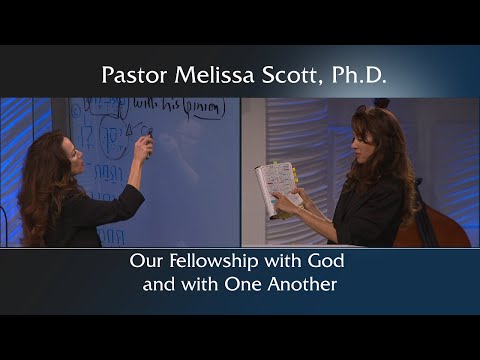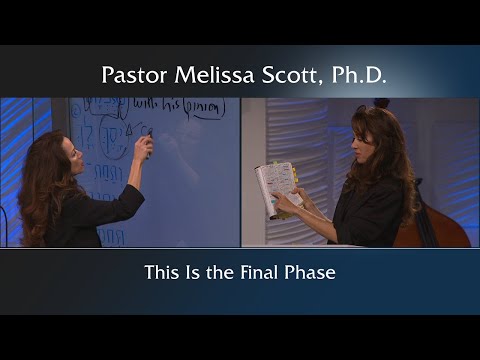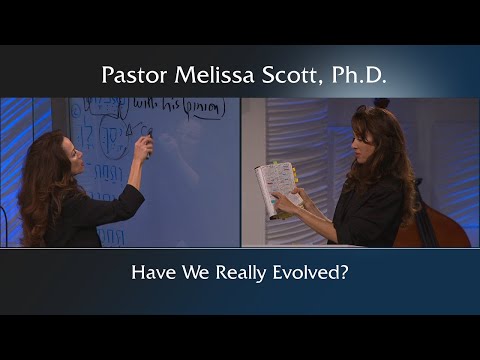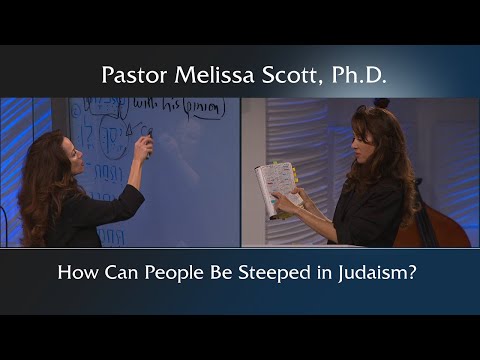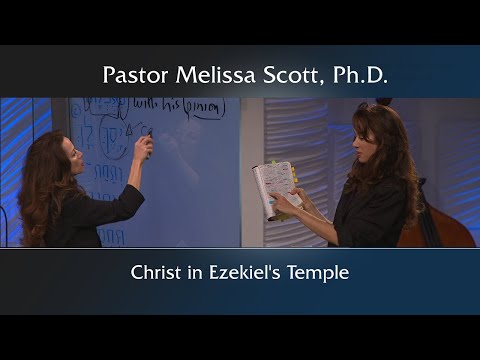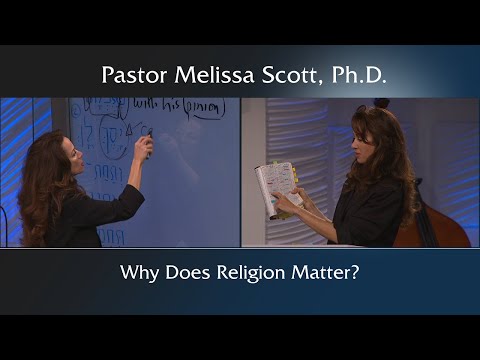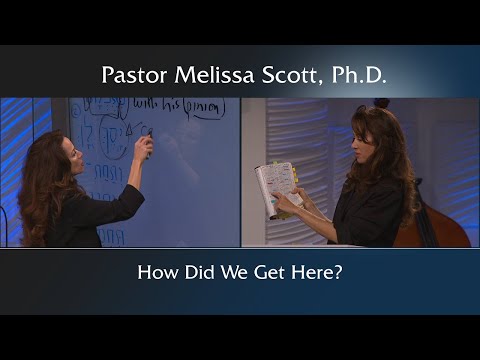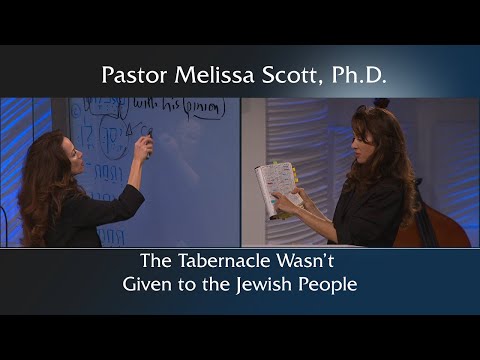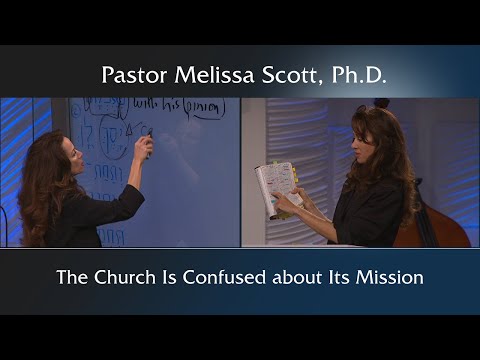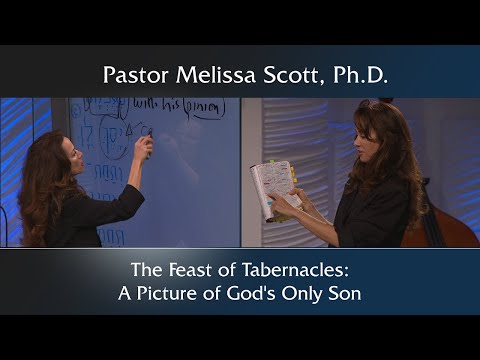
1 John – Our Fellowship with God and with One Another
Trust me in my experience, a lot of people in the church world are very delusional. They think that simply coming into the building, that’s their salvation. Or simply because they know me, I’m somehow, their ticket to heaven. It doesn’t work like that. You’ve got to, it’s, that’s between you and God. This is not a church that has some intermediary here. You are given the goods; you’ve got to work it out. ♪ ♪ ♪ Okay, so today will be a little bit different type of message. Think of it more as a talk than a sermon. Even though the subject matter comes straight out of the Bible, you’d be surprised how many times I touch on a book or a verse, and whether or not people actually put this in writing or not, or whether it’s my perception, I sometimes get the idea that people think, “How could something penned at least minimally, 1900 years ago-plus, depending on which books you’re reading, be applicable and relevant in my life today? Aren’t these just antiquated old things?” And, the answer is, you couldn’t, you couldn’t be further away from the reality of trying, if you are looking for answers in life, these are timeless answers.Now, I’m going to be using the first epistle of John today, which, you know, it’s kind of a strange place for a message, and the message itself will be a little bit strange. So I’m giving you a heads-up. See, sometimes you read, for example, the first epistle of John, which I’m going to read in a second, and you can glean from just the introduction that John, the same John who wrote the Gospel of John, the same John who wrote the book of Revelation, is writing as an absent pastor. We don’t know where he is when he writes this. But what’s interesting about this writing: this opening kind of tells you in a roundabout way that he indeed was an eyewitness and is probably either speaking to eyewitnesses of his eyewitness, which means next generation, or one that is fully removed from even having contact with the risen Lord.And this is important for a reason. See, imagine, I’ll put it to you this way, imagine if we were the eyewitnesses to Christ in the disciples’ day. In our little circle, we would not be talking about things that other people would talk about. Why? Because we saw, we beheld, we have stories to tell. That second generation is listening to the stories. Maybe they may have been part of what Paul addressed as the better part of a group of 500 that were privy to see the risen Lord, maybe not. And then imagine where we are. We’re not eyewitnesses to eyewitnesses, but generations down now just hearers. The difference between the first generation and the third generation is big because by the third generation Christians, say, in the 90s, but before the year 100, apostasy and heresies had already crept into the church. You’re that close to the event, and heresies and apostasies have crept in. The reason why I say that is because we get baffled at seeing how far a certain church or a certain group has fallen out of the orbit of normality for a church.But you wouldn’t think that, say, only three generations or three removed from the source of Christ. So it’s important for us, several things are important. First at the top of the list is to read this book and recognize that there was deliberate intent in the way he opens it. Let me read a little bit, “That which was from the beginning, which we have heard, which we have seen with our eyes, which we have looked upon, and our hands have handled the Word of life,” referencing Christ, “(for the life was manifested, we have seen it, and bear witness, and shew unto you that eternal life, which was with the Father, and was manifested unto us;) that which we have seen and heard declare we unto you, that ye also may have fellowship with us: and truly our fellowship is with the Father, and with his Son, Jesus Christ. And these things write we unto you, that your joy may be full.” So let me stop right there. Telegraphed right at the beginning is the fact “we saw, we touched.” Now, it doesn’t say who the “we” is, okay? It’s just John writing, we don’t know who that other, either other individual or others are, but what’s important here is when you read this, the opening of this, it doesn’t reek of somebody who’s trying to write and tell a story like “Once upon a time,” or even the genealogies.It reeks of somebody who’s saying, “I was there. I saw. I touched. I beheld. I was with Him. Now, are you going to listen to me or not?” Right, it kind of has a little bit of that tone to it. So that’s number one. Number two, the impact, if you will, of believers; so let’s look at the first generation of believers that were around, immediately around Christ, and those disciples radically changed. Do you remember Christ’s word, “Follow me; I will make you fishers of men.” You’ve got the next generation, which we read of a couple of names here and there in the New Testament, they’re helpers to Paul, they’re certain folks that Peter might mention; we’ll call them the next generation of laborers. But imagine someone who was not an eyewitness and was not an eyewitness to the eyewitnesses reading this.How is the connection made to what is here on the pages? And that brings me to say all Scripture is given, inspired by the Holy Spirit. So the Holy Spirit helps the disciples to write all these writings. And embedded in here is a way of saying for us, for the church of Jesus Christ who is not direct eyewitnesses, and not even eyewitnesses to the eyewitnesses, but generations later, the instruction that’s in here is actually off the charts if we would listen to it.And it’s so simple. This is why I said, “Think of today more like a talk than a sermon,” because the instructions are so simple, but they can be missed very easily and they can be misunderstood (snap!) like that. So I want to, I want you to pay attention to something that is in here. The first phrase, if you will, occurs in verse 3, where it says, “That which we have seen and have declared; we’ve declared it unto you, ye also may,” and here are the words I want you to focus on, “have fellowship with us.” And then you’re going to read the same word again when I read down verses 6 and 7, “If we say we have fellowship with him, and walk in darkness, we lie, and we do not the truth: but if we walk in the light, as in; as he is in the light, we have fellowship one with another, and the blood of Jesus Christ his Son cleanseth from all sin.” So fellowship with us, fellowship with Him, and fellowship with one another, and I want to kind of camp out on this theme.That’s why I said, “Think of this more as a talk than a sermon,” because what I’ve found over the years is people will take liberty with words, specifically those that are in this Bible and may not carry the essence of modern language. So first things first, the word “fellowship” will be very familiar to this congregation if you’ve listened at any point, to this word and its cognates, derivatives of koinonia. And if you remember, I have spoken abundantly on this word koinonia. Probably the most famous one for this congregation is Galatians 6:6, “Let him or her that is taught in the word koinonia with the one who teaches him or her.” And that is “jointly share,” and “participate.” So the word can also be translated as “partaker,” “recipient,” or “sharer,” but there’s something important here.You see, “fellowship,” a lot of times in our blanket of English language, has more of a social connotation to it, okay. Fellowship, “Let’s get together and have fellowship,” right? But if we’re really using the word and understanding it aright, the only fellowship – we can have friends that aren’t Christian, but if you’re going to talk about this word within the confines of Scripture, you’re talking about the fact that we are having koinonia with one another, and that is not just social togetherness, but it’s one mindset in Christ that we’re able to get together and essentially share, enjoy, communicate, participate.So it has less to do with social understanding, social gathering, that type of stuff, and more to do with – the common thread to koinonia is God. Now you may say, “Could there be koinonia of other kinds?” Absolutely, but in this particular context, you can’t have this koinonia the way John is referring to it, without something happening to you and me from above that makes that possible. So specifically there’s something very specific being said here. Now let me add to this. The early church, by about the third generation, and we can trace this in ecclesiastical history, begins to have a boatload of heresies creep in. At the top of the list, Christ can, could not be God, could not be supreme deity, Christ could not be all human, and then the last one (these were the most prevalent), Christ could not be all-man and all-God simultaneously.So there were a lot of people that crept into the church to try and pervert Christianity or one’s faith in Christ. Now you tell me how that can’t be a relevant subject for today when most of the churches that you either are exposed to, social media, TV, or otherwise tend to now lean on every social justice – cater to, we’ll call it the small swath of society that is demanding that the church become something it was never intended to be.So if you don’t think heresies have already crept in, I mean, church history is pretty interesting. If you read church history long enough, you’re going to see that there is nothing new that has been invented in terms of heresy. It’s been all seen before; it’s been all done before. Let me go on now because the whole message kind of unfolds as you read through this. So verse 5, “This then is the message which we have heard of him, and declare unto you, that God is light, and in him is no darkness at all. If we say that we have fellowship with him, and walk in darkness, we lie, and we do not tell the truth.” Now you’re going to see this kind of repeated several times. “If we say we have no sin, we deceive ourselves, and the truth is not in us.” So there’s a starting point here. It’s kind of like tough, tough love, having to call something out so that people aren’t delusional about where they think they are in their walk.And that is probably the first big problem that he’s addressing. You’ve got to almost read between the lines because he says, “This is the message which we have heard of him, declare unto you, that God is light, in him there’s no darkness. So if we say we have fellowship with him,” we jointly participate, we share, we are partakers of Him “and walk in darkness, we lie, and do not the truth.” So the first thing I want to point out here in verse 6 is the necessity of being honest with self and that does not come easy. These are, I would say, easily missed, clear, distinct lessons in this book: we ought to not deceive ourselves. Now, what does walking in darkness mean for the believer? If Christ is light, it means you’re not walking with Him. Now we can walk in darkness in the respect of a valley or what we’d call some, something that eclipses us for a time, but not all the time.So the important thing that’s being said here is a lot of times I’ll hear people say – I’ve, I’ve said this now for many weeks on end, “I’m a good person. I do good things,” but that’s not what being a Christian is about. So let me backtrack a little bit. If we say we have fellowship with Him what does that fellowship mean? And again, stay away from the social ideology, and think about whether are you a partaker of Him. Being a partaker of Him begins with being a partaker in His word, and then you start looking at and you can, we’ll peel this apart as the message goes on, but you’ll see every dimension of Christ’s life is put in this book for us actually to share in, not just the work He did and we’re grateful recipients. Let me give you an idea. We’re told, for example, and you’ll hear me mention this again later in the message about fellowship in His sufferings. And you might think, “Well, that! I thought it was all going to be good for me, right? Isn’t that what being a Christian’s about, it’s all good?” No.Part of the trip is comprised of persecution, and suffering in valleys. It’s like the people say, “Well, how, how could this happen to me? Or how could this happen to this person, they’re, they’re, they’re such a God-fearing, God-loving person?” Well, first of all, let’s get this straight. The rain falls on the just and the unjust alike. But if we’re going to talk about fellowship with Him, it means that there isn’t anything at any time that we are engaged in or doing that He’s not aware of. Being; just, it’s a very subtle thing, being aware that He’s aware. That’s kind of the first place of fellowship because a lot of people think, “Well, I’m, I’m in church.I have my little compartments I go to,” but that’s not how it works. So when we talk about fellowship, fellowship with Him, let’s paint this as a diversity of different foci. They are not all positive. Some of them carry negative connotations, negative in the implication of suffering, persecution; those types of things. Now, how many here have suffered ridicule for their faith? Okay? Well, you are a partaker in a microcosm. You’re like a piece of sand in comparison to Christ and the mockery they made of Him, but that’s the concept I’m saying is that there is not just identification with the Lord, but I’m equally a partaker.Now, I could die on a cross a thousand times that wouldn’t save a squirrel, but all the things that I endure, as a Christian, make up that component of fellowship with Him in suffering, in, we’ll call it in the negative, if you will. So, the first thing we have to start looking at is, as I said, John writes, “Fellowship with us, fellowship with Him, and fellowship with one another,” and why these are integral to the health of the church, why these are integral to just the overall mindset. I want you to think of something. For example, when we talk about fellowship, we should equally think about the right use of the word communion; com, “with,” union, communion, “togetherness,” and “withness.” So, if you start kind of processing this, the fellowship concept, when I say “with us,” as John was writing, I want you to think that every time you open the book and are reading any of the writers, you are indeed having fellowship. If you want to say, you’re a partaker of words inspired by the Holy Spirit through John; there is fellowship right there.When you say, “Well, we can’t have fellowship with John; John is long gone,” you’re wrong. Every time I open this book and I’m reading, they are words inspired by the Holy Spirit, but they were written by John, I am sharing in John’s words that, again if you can get out of the social mindset and understand what fellowship means. You have fellowship with John, with Paul, with Peter every time you open the book because, you are sharing their words, yes, inspired through the Holy Spirit, but nevertheless. So, these all line up. Then if you look at the next one when it says, “We have fellowship with him,” I think I’m going to skip that one to come back because it’s quite lengthy. But “fellowship with one another” is quite suggestive.It suggests community. And this is the thing that, if I say one thing today, please hear this. We had people in this church some 30 years ago that thought their duty was to make little pockets of Bible studies and little things here and there; one person who seemingly had a very big ego thought that they – this is when Dr. Scott was still alive – thought that they should be pastoring and leading a group and, you know, I don’t know, lording it over the saints, maybe, who knows. But that’s not the fellowship I’m talking about. See, if you want to know the first book of Scott here, a lot of times people think, “Oh, we’ll get together for a Bible study,” and unless you have the discipline, whoever is orchestrating this Bible study, it’s going to turn into a social gathering.It’s going to turn into; sorry, I’m just going to say it, it’s going to turn into a BS session, okay? Everybody talks about what they ate, what they cooked, what their kids did, how bad things are, what medications they take, and less gospel, less Bible teaching, and more gossiping and social, socializing, okay? I’m not against people socializing. I’m saying, that if you’re going to do something for Christ and God’s sake, you better understand what you’re doing. And that’s why I said to you, even me, taking up 10 minutes at the beginning of a message to deliver a message before the message, I don’t even like that; it teeters on – I’m sharing things with you to answer questions, but even that’s kind of like, eh, I’m not sure about that, okay? But this one I am sure about.Fellowship with one another is a community, but it is not the community as in social gatherings, “Let’s grab a cup of coffee. Let’s sit down and cut the, shoot the breeze, all right?” (Laughter.) It’s not that type of stuff. Yeah, I know. It’s difficult. I’m struggling today, folks. I am struggling today. I just want you to know that. But think about this from the same writer, and I’ve quoted this before. Remember what John says, it’s Jesus’ words, when they ask, “Well, how will we know, how will people know that we are Your disciples?” He says, “Because you have love for one another.” So, and we’re not talking about Phileo, “I do for you, you do for me.” We’re talking about agape that comes from God, that has no strings attached, “Hey, I got your back. You don’t need to repay me.” Whatever, your issue is, think of it that way. So, if you bring this concept together with what fellowship with both Him and with one another means, there has to be a common center point, and that is everything that flows from Christ to us.We all may have different gifts, as Paul describes in Corinthians, but we all have this singular thing which is called faith in Christ, trusting Christ, and understanding His finished work. So when we talk about fellowship, there’s some other component I have to bring in here before I can move on in the book, and that is we are connected: Father, Son, through the Spirit. So when we talk about fellowship, you can’t go, “Yeah, we’re having a get-together. Let’s do a fellowship.” We’re talking about the same way that God is, Father, Son, Spirit. When we gather, we are the complement of one another in the body of Christ, not as a social, get-together, or whatever you want to call that, but as fathers who are connected. You know how remarkable it is when I meet people and they’ll say, “Did you know so-and-so’s sick?” or “We’re praying for them,” or “Let’s get together and pray for them,” or “Let’s pray for them right now.” There you have your fellowship, your, your, your immediately thinking, “What can we do in the Spirit of God together?” And that will never produce fleshly ideas, fleshly works, things of that nature.So remember, I told you, it’s going to be a different type of message because these instructions fortify. They’re so simple, but they fortify each listener and they fortify the church. Let me go back to something I said earlier about not being honest with myself. One of the worst, we’ll call it faith killers, is self-delusion. And you might say, “Well, how, how so? I don’t understand what you mean.” People who think they are above everything, people who think their faith is superior. I’ve met people like that. Have you met people like that? Their faith is superior. They attend the high holiness of whatever you whatchamacallit church.And they’ve been there for 50 years and they know every, every Bible verse that applies to you as nothing but a heathen vomited or something. And they’ll quote it to you too, all right? My point is, that if we say we have fellowship with one another, we are not delusional about ourselves. We are not deceiving ourselves. And I find, trust me in my experience, a lot of people in the church world are very delusional. They think that simply coming into the building, that’s their salvation. Or simply because they know me, I’m somehow, their ticket to heaven. It doesn’t work like that. You’ve got to, it’s, that’s between you and God. This is not a church that has some intermediary here.You are given the goods; you’ve got to work it out. So when we talk about this concept of fellowship, and there’s sharing in this, I’ve seen this many times even in this congregation. Somebody has been promoted. They’ve passed away, husband or wife, and people will come to the comfort, not come to socialize, come to the comfort of. That may be in the form of praying for the person without them even knowing it. That may be in the form of passing, saying a word to them, or sharing a Scripture with them. But it’s all rooted in Christ. It’s not rooted in social, “Hey, let’s grab a cup of coffee so you can feel better.” You can do that with anybody at any time. There’s nothing spiritual about that. So these are the things that I’m, I’m looking at and I’m focused on. Now, if we talk about, for example, comfort. Now we can comfort one another. We can understand the brotherhood of believers. I’ve said this before, When one hurts in the body, we all hurt.You know, too bad that that mindset hasn’t permeated to the degree that it should, because we would see the church be completely different. When you see somebody who’s suffering, yes, people call in prayer requests, We have teams of people that go in and they pray in the chapel. I read the messages, I pray, but I’m not talking about that type of togetherness. I’m talking about the togetherness that understands we are fighting a great foe on the outside. Now we can equally be destroyed from the inside if our faith isn’t strong, if our focus isn’t right. And this is what John actually; believe it or not, this is what he is making corrections for in this book.You might not think of it at first like this. Why? Because he goes from, for example, let me juxtapose them. We say, “We have fellowship with him and walk in darkness, we lie, and we do not the truth. But if we walk in the light, as he is in the light, we have fellowship with one another, and the blood of Jesus Christ His Son cleanseth us from all sin.” So remember I’ve even taught on this word for “cleansing,” which we get our English word for “authorized” from. So staying connected in Christ, you are constantly, if you say, being kept, washed, cleansed. And there is a juxtaposition between “walking in darkness, lying, do not the truth,” versus trusting Christ, “walking in His light and being cleansed.” Then he says, “If we say we have no sin,” and I’ve met those people too, “we deceive ourselves, the truth is not in us. But if we confess,” so he’s juxtaposing, “if you say you have no sin, you deceive yourselves, the truth is not in us. But if we confess our sins, he is faithful and just to forgive us our sins, and to cleanse us from all unrighteousness.If we say that we have not sinned,” listen to what he says: “If we say we have not sinned,” it doesn’t say we’re liars, it says, “we make him a liar.” Now I want you to think about that for a second because God knows us. He knows our heart. He knows where we’ve been. So anybody that comes into this universe and says, “Nope, not me,” when God’s word specifically; and sorry to tell you this, but not just from Paul, from Isaiah, over and over again, the concept of sin is very, very clear. I’ve quoted it before, you should know it by heart, Romans 3:23, no one can say otherwise: “All have sinned and fallen short of the glory of God.” If you look at it from Isaiah, “All we like sheep have gone astray.We’ve turned each one toward his way. And our righteousness is as filthy rags.” There is no ability here to wiggle out of this if you will. So the important thing is, understanding, you’ve heard the phrase during COVID, “We’re all in this together.” But this is one where it’s true. Why? Based on our Adamic container and then everything we do in our lifetime, we are all of us, me, you, everybody in this room, anyone in the sound of my voice, born in the state of sinning flesh and then the sins that you commit during your lifetime.So anybody that says, “No,” again, think of; going back to “fellowship.” The fellowship with Him puts the light on you that reveals all the dirt. Stand in that light long enough; that’s Christ’s light. We’re in the darkness. It’s all going to come out. But if you’ve never stood in that light, you can be delusional or you can stand in that light and turn around, be pharisaical, and say, “Not me.” So believe it or not, every part of what he’s saying comes back to fellowship. It’s either fellowship with him or fellowship with one another. And I love the fact that you keep reading and you can see exactly how it’s almost like it’s a problem, a solution. Keep reading, “My little children, these things write I unto you, that ye sin not.” Here he goes again! Boy, Pastor John’s hung up on this “sin not” thing, right? “And if any man sin, we have an advocate with the Father,” that word “advocate,” the Greek word parakletos, the same word we have, we use for the “Comforter,” the Holy Spirit.“We have an advocate with the Father, Jesus Christ, the righteous: and he is the propitiation for our sins,” He is, the Greek word hilasmos, He is the “covering,” He is the removal, He is the washing, the cleansing; He does it all. So the question would be – and he says, “Not only for our sins but the sins of the whole world.” So the question would be, why would you not confess your sins if He’s faithful and just to forgive them? And you would not confess your sins to Him if you were a liar or if the truth wasn’t in you, because you’d recognize right away there is something called conviction that comes from the Holy Spirit that makes you, you on your own, our nature is not wired to come clean.The Holy Spirit has a way of bringing you under that conviction where you say, “I, I can’t take this for another minute. Bluh!” Right? Whatever that is, all right? So what we are looking at over and over again is the connection we have with Christ and with one another. And then he goes on to say, “Hereby we do know that we know him if we keep His commandments,” and he’s not talking about the law. “He that saith, I know him, and keepeth not his commandments, is a liar, and the truth is not in Him.” Again, do you notice a pattern? He, “he deceives himself,” he, “the truth is not in him,” here again, “the truth is not in him.” So keeping His commandments, you’ve got to think back a little bit to what John wrote in John 14, 15, and 16 because if you remember, the question is asked to Jesus, “Which are the greatest commandments of all? Which is the greatest commandment of all?” And He says, “To love God with all your heart, soul, and mind, with every fiber of your being, and” to what? “Love one another.” There you go.Here is the fellowship with God and the fellowship with fellowman. So if you think about it, these are the commandments. Now there are other things that Jesus said, “Do this until I return,” speaking of the table of the Lord. There are, there are things that He did spell out and say these are things that essentially, for the people who are following Him, this is what you do. But John specifically referring to, “Keep not his commandments,” is referring to the thing I just referenced. And he says, “But whoso keepeth his word, in him verily is the love of God perfected: hereby we know that we are in him. He that saith he abideth in him ought himself also so to walk, even as he walked.” So again, sift it away. There’s a lot of words there. If you sift it enough, you’re going to see even the abiding principle, fellowship. It all comes back to, the union we have with God. Now if that fellowship is taken seriously, something else can happen, and that is the church, the church can always succumb to error. We’re humans touching the things of God.But if you think about it, what will keep the church on track? Let’s talk about it now. Let’s talk about people saying, “I think we should have a flag outside the church,” or, “I think we should have an emblem of this,” or, “We should be supporting that.” Now people who are keeping themselves in the love of God, which is what Jude said, “Keep yourselves in the love of God,” are constantly in communion with God, are going to look upon these things and say, “No.” “No, and hell no!” That is why I’m saying to you, you know, sometimes – I said this is more of a talk than a sermon – sometimes you need to just sift through the Scripture to see, “Wait a minute. There’s something already said that addresses this.” Pastors, including myself, we have one mission.See, I don’t know what’s wrong. I get letters from people saying, “Well, my pastor doesn’t teach the Bible anymore.” I don’t know what’s wrong with you. You were if you were called to teach out of this book, that is your calling. People are depending on you to feed them the word of God. There isn’t some choice. “Well, you know, it’s kind of boring now and I’ll, I’ll, I’ll choose to feed you with some other stuff like climate change.” Go chew on some ice, that’ll make you feel better. Here, look at it from a different direction. The prophet Amos asked the question, “Can two walk together except they are agreed?” And that is not like we understand, “We agree, we, we agree with each other,” but rather can two walk together except they agreed to have the mind of the Lord which comes from the fellowship we have with Him.That keeps the integrity of the church and the way, you surround yourself with like-minded people, which is very difficult to do, by the way, but if you do, you’ll find yourself, even if for a moment you are entertained or drifted somewhere, you’ll find that those are the people that might give you the good nudge to remind you of your fellowship with one another which is in Christ. So there are all these, what I’d call very good reasons to read this book with a different set of eyes because you begin to see how easy it is. If you keep reading, verse 7, “Brethren, I write no new commandment unto you, but an old commandment which ye have heard, which ye had from the beginning.The old commandment is the word which ye have heard from the beginning. Again, a new commandment I write unto you, which thing is true in him and you: because the darkness is past, and the true light now shineth. He that saith he is in the light, and hateth his brother, is in darkness even until now.” Again, there are all these juxtapositions, light and darkness, sin, confessing sin. So when he says here, “hateth his brother,” and “He that loveth his brother abideth in the light, and there is none occasion of stumbling in him. But he that hateth his brother is darkness, and walketh in darkness, and knoweth not whither he goeth, because the darkness hath blindeth his eyes.” So very interesting again and again, what happens in churches? You get people that come in, and people tend to do this, people gossip.People like to gossip. If they’re not gossiping, they like to criticize. Now imagine being on my end of things, see, I’ve got all these eyeballs looking at me, imagine being on my end of things, okay? That’s why I said I like to refer to the one-room classroom because imagine that people are sitting right in front of me right now saying, “How is this going to apply to me? , I came here needing healing. I need to be healed.” You’ve got other people saying, “I wonder when she’s going to start teaching with languages because I miss that.That’s more complex and that’s more, you know, high intellect.” But tell you what, maybe some of the church problems; not just in this church, but every church, are at the most basic fundamental level. They are not nestled in complexity. They are not nestled in great oratory skills. The problem with a lot of churches is people get bored or they start getting ideas of what the church should be, and how it ought to function, and they fall out of fellowship, both with me. Let me do this in a better order. With God first, they think they’re still in fellowship with God. I always said, “You know, if you think you can do better than me week in and week out, please write your name, your address, and your information and mail it in. And until then, keep your mouth shut,” because if you have to assume the responsibility that I have to assume, imagine having a restaurant where you’ve got to cater to hundreds of different taste buds, and some people like it spicy and some people like it salty, and some people don’t like salt at all.Now you’ve got all these minute details here, and there’s always somebody that has to be unhappy about something, right? My point is, if we have fellowship with Him and with one another in the truest sense, we find those simple truths and we apply them. And we start looking at ourselves. Instead of looking at the person back there, “Ah-ah,” we look at ourselves. Now that is the job of the Holy Spirit to help us to see ourselves aright, but you begin to see where things may not be as balanced in terms of fellowship. We may be leaning more on the flesh, and we talk about fellowship, it may be more friendship, but that’s not what I’m discussing today, and that’s and that’s not what will keep the church of Jesus Christ strong. Fellowship with Him, prayer I think I’ve kind of touched on that. Prayer is one of those where we get to – think about it this way. You’re sending your words up to Him. You’re also partaking. You’re partaking of His strength. You are partaking of His word, His will, His way. So it’s like putting this all together and for somebody who says, “Well, I, that’s not me, I’m too messed up.” Well, then go back to where it says, “If you confess your sins,” and please don’t do this whole, “Well, I read the book of James and James says we should talk to one another.” It’s very clear; James is the only person in the whole Bible that says that.Everybody else says, “Talk to God; don’t talk to me.” Talk to God. I’m to tell you don’t talk to me; talk to God about it. He’s the only one that can fix your problems. You, you can have my ear, and I can pray for you, but the problems that you need to be fixed require fellowship with Him. That’s pretty simple. Now I’m not talking about sickness, prayer, prayer requests, and things like that, but for the most part, what people tend to do. And when we are not honest with ourselves, and just hear me out, you read the opening of Romans, the first at least two chapters, people when they read that, some people will recoil. They say, “Oh, that’s, that’s just.. . .” But the reality is Paul was laying it out just as clearly as John is that sin is a, it’s in our blueprint. And if you think about Romans 7, “What I want to do I find myself not doing,” and visa versa, the idea is we are in a constant battle till the end over sin. You’re not going to go and sin no more, but you can be in fellowship with God and working it out and wrestling it out or fellowship with one another. That is, if I have agape for my brother or my sister, I’m able to say, “I’m sorry, you’re talking to me about adding a letter. We should have more inclusive. . .” I’m using that as an example, “but the Word already says all are welcome. Why do we need to do this?” That would be someone who’s got the mind of the Lord, who is in fellowship, not in maliciousness.And that’s why I said to you, if we understand this, this little book was written in the face of people coming in, penetrating the church and making all types of professions about things that were a lie and John called it exactly what it was. People who came in with the intent to make derision between parishioners, people who came in with the intent to make misleading statements that people might believe to lure them away and out of the church.Tell me that’s not what goes on or what’s going on in America. You see a lot of that. You may see a lot of people who seem to be worshiping together, but most pastors don’t want to talk about this because this requires some instruction. And the instruction is not; see, typical pastoral speech might be, “Everybody needs to get along.” That’s not what I’m saying. Everybody needs to be connected to Christ as Christians. You follow me as I follow Christ, you are in fellowship with one another, you’re in fellowship with Him, and the body can stay strong. It’s not going to be affected by what the world, the flesh, and the devil’s trying to put on it.So think about this. The other thing I want to talk, talk about here is John is emphasizing to his flock that we serve a God who forgives. Over and over he says, “If you say you have no sin,” and so forth. So what was going on here, wherever John is writing, that would make him repeatedly – there’s, there is a repetition here. The repetition is “we’re walking in the light, we’re no more in darkness, but if you say that you’re, you’re having fellowship with Him and you’re in, you’re in walking in darkness, you’re a liar, the truth isn’t in you. If you say thus and so; but the blood cleanses you,” and then he says, “If we say we have no sin, we deceive ourselves, the truth is – but if we confess our sins,” so each one of these says the plague that hit this church was undoubtedly people coming in and usurping, being dishonest about the structure of the church, who Christ is, maybe even who John is, or the relation to one another.A church like that cannot stand. That’s not how the church overcomes. The church will always overcome when we stay connected and you lose that connection, the minute that connection is gone, the church is going to die. Period. Now if you keep going because he says some pretty good stuff here. If you keep going, “He that loveth his brother abideth in the light, and there is none occasion of stumbling in him. But he that hateth his brother is darkness; is in darkness, and walketh in darkness, and knoweth not whither he goeth because the darkness has blinded his eyes.” Now what’s interesting is that each of these sections is juxtaposed, good and bad, or problem and solution. It goes on to say, “I write unto you, little children because your sins are forgiven for his name’s sake. I write unto you, fathers because you have known him that is from the beginning. I write unto you, young men because ye have overcome the wicked one.I write unto you little children, because ye have known the Father. I have written unto you, fathers, because ye have known him that is from the beginning. I have written unto you, young men, because you are strong, and the word of God abideth in you, and ye have overcome the wicked one.” Think the whole time he’s talking, he’s trying to say, “These people stayed connected.” The rest of the people, usurpers or otherwise, I believe this is why he goes on to say, “Love not the world, neither the things that are in the world. If any man loves the world, the love of the Father is not in him.” And that’s not saying that you can’t enjoy, but what you put first, what is the first preference on your list? And it comes back to being connected in fellowship with God.That will keep everything in balance. You know, the people that say, “Well, I just didn’t have time, to pray,” or, “I don’t have time to read.” You may want to make time. That’s how you’re going to, some, for some people, that’s how you’re going to stay in fellowship. For other people, I can tell you, they have what I call battlefield religion, which is they’re only in fellowship with God when the stuff’s hitting the fan when they need God.Otherwise, God’s an afterthought. When everything’s good, when the blessings come, there’s no going back and saying, “Lord, what did I do to deserve this, but thank You.” And again, it comes back to that connection in fellowship. And he says, “For all that is in the world, the lust of the flesh, the lust of the eyes, the pride of life, is not of the Father, but it is of the world. And the world passeth away, and the lust thereof: but he that doeth the will of God abideth forever.” So now, let me ask you this question.If we are talking about this you want it from somebody else. Paul says in Ephesians 5, “We’re not to have fellowship with darkness.” Again, that’s the other side of that equation. So partaking with God can go a long way and be very spread out. As I said, if you’re going to look at what is the main problem in churches today, and I’m telling you, not that I’ve been to every church in America, but I can tell you it’s complacency. And the first complacency is not about the doing of things, it’s complacency in staying connected. That connection provides the spillover connection to one another. That fellowship connection I’m going to say it like this, it keeps you in check, and it keeps the church in check. When I say tough times are ahead, tough times are coming. There’s no doubt. How they will affect every one of us, I have no idea. And the only thing I can tell you is there are certain staples that if you adhere or abide by them, no matter what’s going on, no matter what, things in your universe around you may change, but this container here and all that’s within it will not be moved.And that is staying with that proper mindset. Now, John wrote to these people if you’re reading right, there was some type of tumult in the congregation. As I said, there were heresies and there was apostasy. What’s different than today? We’ve got all that stuff running rampant everywhere, and people that think that we should change the word of God, we should rewrite the Bible, we should remove the pronouns, we should, and just keep going.But the fact of the matter is for, at least, let’s talk about beyond the New Testament, 2,000 or 3,000 years, however long the entire book encompasses, no one has had a problem up until this recent time. Oh, there have been periodic groups here and there, but no one’s had a problem with being included or not included, and it used to be you’re either in the church of Jesus Christ or you’re not. It was, those were the choices. Now it’s like, “Well, let me decide, is my church inclusive enough and does my pastor wear enough colors, you know? Because that’s important. You have to, you have to look the part, right, to be inclusive. You’ve got to wear all the colors. And does the outside of the building say that announcement, you know, with all the colors on it too?” See, these are the things that in my mind are what have destroyed or are in the process of destroying the church in America, lack of the word of God, lack of the teaching of the word of God, and substitute that for entertainment and social issues.And then if you’re in an even Bible-based church, the lack of being connected with God and through that connection with one another, which keeps everything, I’m sorry to say it keeps everything in alignment. It keeps a brother or a sister in check. It keeps people from becoming judgmental, and critical. When you think about it, you’re able to put yourself in that other person’s shoes. You’re able to look at them with empathy, with compassion, with understanding. That all encompasses the word agape, to love one another, and that cannot happen because you will it to. The, we’ll call it the development of the brotherhood or the sisterhood within the body of Christ isn’t something that you work on. It’s something that when God places a new heart in you and a new mindset in you, you’re looking at people, the people that previously would have gone, “Oh God, get me out of here. I don’t want to see that person.” You’re now looking at them, you have compassion, you want to inquire that they’re okay and how they’re doing in the Lord.And these are the things that I’m talking about. This is what John was writing about. And it’s, I think it’s very important to understand something else. If you keep reading, he talks about, for example, eternal life. He talks about what, what’s separates a believer from a nonbeliever if you want to call it that. And then essentially, we’ll call it the miscellaneous part when he says, “Try the spirits.” A lot was going on here, and I think if you reread this book with the mindset, the modern mindset of being buffeted from every side, you recognize that sifting this away comes down to two things, and I keep repeating them, but there they are the fellowship that we have with Him and the fellowship that we have with one another.And with Him, we’re in the word. We’re able to see the errors. Now my job is not to go into somebody else’s universe of responsibility in some other church and point out their flaws or their errors. But if you are in the word, and if the word is guiding you, and if the word is a lamp under your feet, then you’re not walking in darkness, and you’re able to see all that is not or what is being perverted or what’s being omitted. And you’re able to take that and recognize – first place I have to focus on if these things are happening in my sphere is I need; I’m sorry, this is one time where I’m going to say it, I’ve got to look out for me and I’ve got to make sure I’m connected to God. You are to examine yourself to see that you’re in the faith.And if that faith connection is there, then you’re recognizing the, we’ll call it the straight-stick mindset that says, “I don’t – I’m not interested in all the crooked sticks. I’m not interested in the gimmicks. I don’t need entertainment.” We can go home for goodness’ sake. If you want entertainment, if you want music for an hour, go home and blast the music, your liking, your preference, your choice; not mine, because I’m not there, okay? But this is probably the most important, as simple as this is, it’s probably the most important, we’ll call it pastoral talk to ensure that as things change and as things maybe go a little bit strange in this land we call America and even within what I call the attacks upon the church, it’s important to recognize the body of believers that we are.And it doesn’t mean that I want to spend every waking hour with some of my brothers or sisters, not; that’s not the type of fellowship I’m talking about. But I am talking about staying connected to Him. And I guarantee you something, a reading, a rereading of 1 John will tell you something, this aged pastor was concerned for his congregation and the things that they were experiencing are not too different than the things that we are going through right now. When you think about that, it means, I’m going to take comfort in going back and rereading this book. Just in the first two chapters alone, there’s enough solid stuff, stuff there to say, “Okay, and even if you miss my main point, there’s a secondary point here.” Why is he talking so much about if a person sins, if a person sins? Do you think maybe they had lost their way in doctrine? That’s the other thing that happens when we get out of fellowship with God and with one another, we also get bent and warped out of doctrine.And it is the doctrine, sound doctrine that paves the way for us to walk. So all of these things tied together become an important component of keeping the body of Christ. It’s His church. He didn’t say, “I put you here and I leave you, I leave you to do whatever you want.” We still have a book to follow, a guide, if you will, through the Spirit and the Word. And through the Spirit and the Word are going to be the guide for this church, either until God takes me home or until Jesus comes. So for somebody here who came and said, “Well, you know, I was hoping that you might talk about something a little bit more complex.” This is probably one of the more complex subjects cloaked in very great simplicity: how to keep the church strong, united, and carefully and methodically.I’m not trying, to live your life for you, but I am trying to tell you, these are things that happened in 90, in the year 90, or somewhere between 90 and 100. What makes us think that we can navigate something better in the year 2023? Same problems, because the same problems exist today as they did back then, if not more convoluted. Just think of it that way. They might have been dealing with a handful of crazy people; we’ve got a whole nation of them, right? (Laughter.) So with that being said, I pray that you take this and don’t take this as something just to kind of, “Okay, I, I park that.” I want you to think about this because it is indeed the thing that will keep the church anchored, no matter what happens here, your connection with Him, your fellowship with Him, your partaking with Him in joy, in sorrow, in suffering; everything that you could think of, and then the fellowship with one another, which I call that the balancing act. You’re not to be someone else’s judge or someone else’s ruler, but we balance things out and we keep things focused on Him.That’s the recipe, at least right now I’m telling you, that’s the recipe to keep us strong, fortified, and a united body in Jesus’ name. That’s my message. (Applause.) You have been watching me, Pastor Melissa Scott, live from Glendale, California at Faith Center. If you would like to attend the service with us, on Sunday at 11 a.m., simply call 1-800-338-3030 to receive your pass. If you’d like more teaching and you’d like to go straight to our website, the address is www.PastorMelissaScott.com.As found on YouTubehttp://flywait.4parkinson.hop.clickbank.net $49.⁰⁰Blue Heron Health NewsI thought my Parkinson’s diagnosis was a death sentence – I was so wrong!
Instead of surrendering as the disease ruined my physical and mental health… I turned everything around to be healthier, happier, and more energetic than I was BEFORE my diagnosis!The Parkinson’s Protocol Review ||Beat the Parkinson’s Disease Only 12 steps||Blue Heron Health News12 simple steps tackled this dreadful disease at its source – and saw my symptoms melt away in daysWelcome!You’ve just read Steve Peterson’s story of how they treated Parkinson’s Disease – one of the cruelest illnesses known to man.The Parkinson’s Disease Protocol has delivered thousands of similar stories – all from ordinary men and women who decided to hit that disease hard – before it had a chance to ruin their lives.These are people whofollowed their doctor’s advice – but faced an illness that was only going to get worse
knew that unless they did something completely different, they were facing a health disaster
found out that others had eliminated their symptoms – so decided to do what they had done
The causes of Parkinson’s Disease are no longer a mystery. We now know why it happens – so we know how to stop it.Which means suffering from Parkinson’s is no longer inevitable. It’s a choice.
And you can choose to be well again.
Instead of an ongoing loss of physical disability and a degenerating brain… You can choose to be vibrantly healthy, energetic, and happy. Just like you were before all this started.A series of small, simple lifestyle changes eases away both the causes and the effects of this horrible disease.The Parkinson’s Protocol shows you those exact changes. So now you can reliably and quickly eliminate the causes – and effects – of your illness once and for all.The program works. We have several thousand stunning successes now – which is why we have no hesitation in offering you a complete money-back guarantee: http://flywait.4parkinson.hop.clickbank.netIf your Parkinson’s symptoms haven’t significantly reduced within 60 days of buying this program you can have all your money back… No questions asked!Parkinson’s gets much worse over time. Don’t let that happen to you. Address it now.

